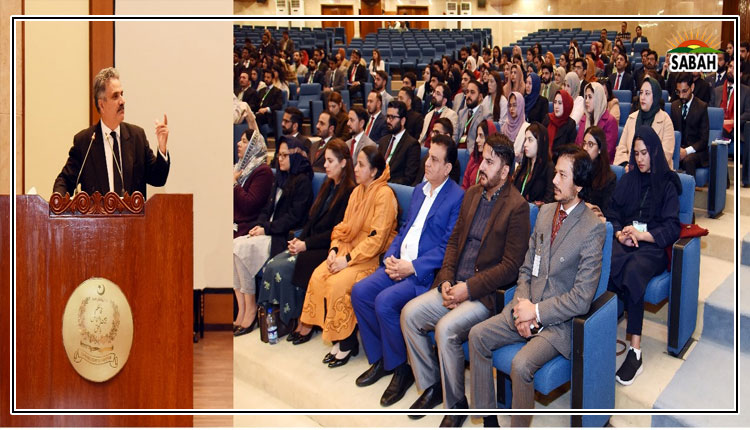CJP Justice Yahya Afridi advises probationers to uphold principles of justice, fairness & respect in their interactions with public
ISLAMABAD, Jan 07 (SABAH): A delegation of probationary officers undergoing training at the Civil Services Academy (CSA), Lahore, accompanied by the Director of CSA, visited the Supreme Court of Pakistan on Tuesday as part of their study tour. The delegation also met the Chief Justice of Pakistan Justice Yahya Afridi, who warmly congratulated them on their success in joining the civil services through a competitive examination.
During the session, Chief Justice of Pakistan Justice Yahya Afridi provided an insightful introduction to Pakistan’s constitutional history, tracing its evolution from the country’s independence in 1947 to the 2024 promulgation of the 26th Constitutional Amendment. He emphasized the significance of the Constitution as the fundamental document that governs the State’s functions and highlighted the concept of the trichotomy of power enshrined in the 1973 Constitution. The Chief Justice explained the distinct yet interdependent roles of the three pillars of the state: the Legislature, tasked with making and amending laws; the Executive, responsible for implementing laws; and the Judiciary, charged with interpreting laws and ensuring justice.
The Chief Justice also addressed the pressing issue of case pendency in Pakistan’s judicial system. He elaborated on the hierarchical structure of the judiciary, comprising the Supreme Court, High Courts, and District Courts. He highlighted the critical role of District Courts as the primary interface for litigants and the starting point of the litigation process. Stressing the importance of timely justice, he mentioned the role of National Judicial Policy Making Committee as a policy-making forum to address the backlog of cases. He underlined the judiciary’s commitment to reducing delays and providing relief to litigants, thereby fostering trust in judicial institutions.
Sharing his experiences from visits to remote districts across the provinces, the Chief Justice underscored the need for patient hearings and empathetic engagement with litigants. He advised the probationers to uphold the principles of justice, fairness, and respect in their interactions with the public and to resolve issues strictly within the ambit of the law.
The Registrar of the Supreme Court, Muhammad Salim Khan, provided a comprehensive briefing on the Chief Justice’s reformative agenda. He explained that the reforms are designed to be citizen-centric, with a primary focus on ensuring access to swift and cost-effective justice for the common man as currently 57,347 cases pending in the Supreme Court and 2.4 million cases across all judicial tiers. Special attention is being given to vulnerable segments of society, including women, children, physically challenged individuals, and overseas Pakistanis.
The Registrar highlighted that the reform process emphasizes improving processes and procedures rather than expanding institutional size. These reforms are homegrown and based on the experience of indigenous employees of the Supreme Court. This approach ensures efficiency without incurring additional costs or causing disruptions to routine operations.
The Registrar elaborated on the adoption of technology as a key tool in the reform initiative. Existing software from High Courts is being customized and replicated to expedite implementation and avoid unnecessary costs. The reforms also include a phased framework developed by a core group of experts, with clear targets set for achievement within 3-6 months, 3 years, and 5 years. He stressed that the focus is on providing predictable and timely justice to restore citizens’ trust in the judicial system and, by extension, the state. He further noted that sustained and consistent delivery of justice is essential to prevent the erosion of state legitimacy and to counter the influence of non-state actors.
The Registrar also shared that the Supreme Court has opened a dedicated communication channel for citizens, litigants, and stakeholders to provide feedback on judicial reforms through the official website https://www.scp.gov.pk/
The session concluded with an engaging question-and-answer discussion, during which the Chief Justice addressed queries from the probationers. As a token of respect and goodwill, souvenirs were exchanged between the delegation and the Supreme Court.












